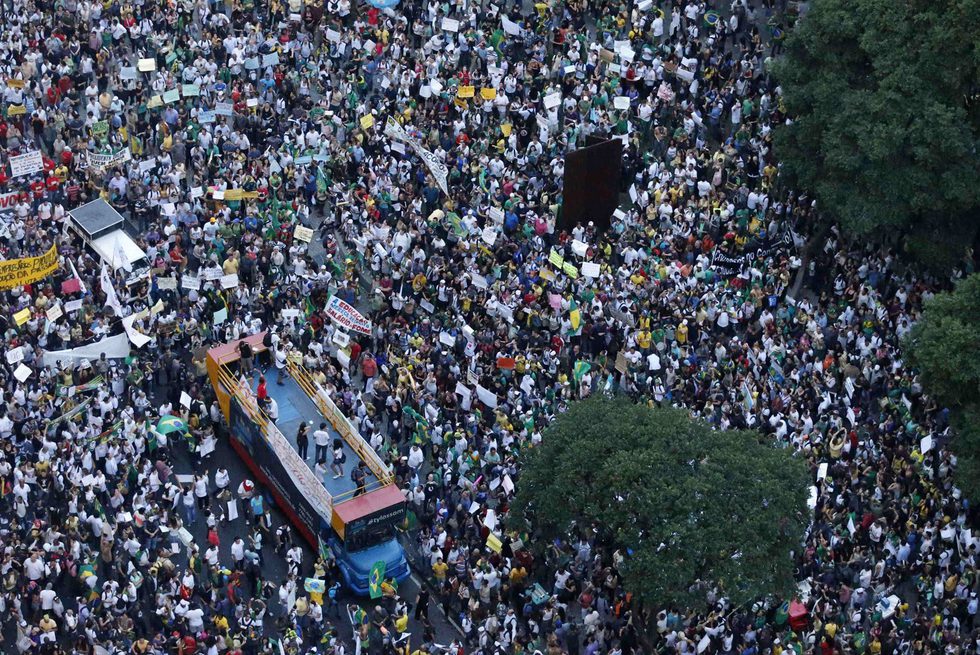Demonstrations and the Quilombola Cause: New Protests for Old Claims
From the Series: Protesting Democracy in Brazil
From the Series: Protesting Democracy in Brazil

Upon first analysis, the demonstrations taking place in Brazil find support in a wide range of social movements. These produce diverse interpretations of the events themselves. But our argument here is that even groups and social movements that do not seem to form the very core of these demonstrations nonetheless express a coherent body of claims. Put differently, voices crying out for social recognition from the state ended up performing in a kind of unison, notwithstanding their seemingly differentiated agendas.
Along these lines, we wish to discuss the role of the quilombola movement in these contemporary protests. The quilombolas are defined through ethnic self-attribution based on territorial, cultural, and symbolic links with the Brazilian slavery regime of the past. A community that is legally recognized as “remnants of the quilombo” is entitled to certain rights, such as communal ownership of land, enrollment in specific public policies, etc.
There is a clear connection between the aspirations of various social movements participating in the protests and the demands of the quilombola agenda. At this moment, discontent with the failure of social policies in Brazil is widespread. However, the quilombola fight is not only a result of the inadequacy of current policies and is most certainly not a recent demand. The quilombola movement has shown, in the last four decades, the continuity and the consistency necessary to be considered one of the more relevant voices to be heard in these troubled times.
Considering the history of Brazil, the 1980s marked several important milestones in the political and legal achievements of the quilombolas. Article 68 of the Brazilian Federal Constitution of 1988 created a revolution in the process of the recognition of quilombolacommunities in Brazil. At that moment, the favorable context allowed a diversity of black collectivities in Brazil to be recognized in the legal category “remnants of the quilombo.”
Years later, the election of Luis Inácio Lula da Silva (President from 2003–2011) represented for the quilombolas and others involved in struggles associated with ethnicity the prospect of a government that would bring recognition to sectors of society that have always been excluded from the growth process. After Lula took office, workshops with quilombolas were organized to help them collaborate with researchers and government sectors in fostering the rights of quilombolas. The summary of the discussions was forwarded to the presidency, and the result came on November 20, 2003, with the sanction on Decree 4887/03, which defines the responsibilities of government agencies in relation to the demarcation and delimitation processes of quilombolas’ territories.
The government of Luís Inácio Lula da Silva, which was based on policies of social inclusion at different levels, gave room to a “developmental” rhetoric in Dilma Rousseff’s government. This new governmental practice aims to consolidate the image of Brazil as a global power. Paradoxically, however, such rhetoric generated a sort of emptying of issues relating to the recognition and rights of quilombola, returning conservative sectors of Brazilian society to decision-making positions, and bringing to a boiling point the discontent of those who struggle for ethnic rights’ effectiveness in the country.
The protests that moved Brazil were a criticism of the government’s lack of sensitivity in dealing with many sectors of society, a lack of sensitivity caused by a misguided strategy to maintain governability. To guarantee the majority of votes in the congress houses, Dilma’s government was forced to concede to some very conservative demands. The distance between the government and the social movements grew bigger, and dialogue turned into a struggle.
In comparison to Lula’s time, Dilma’s years were responsible for mistreating not only the organized and traditional social movements, but the huge and constantly growing Brazilian middle class as well. The opinion of many is that politics and social care are deteriorating and the courses of economic decisions are not helping. Incompetence, immobility and lack of dialogue on the part of the government explain the disorganized and spontaneous outbreak of the large protests.
The problem of the quilombolas’ territories’ recognition in Brazil, in spite of the advances achieved in the 1980s, was shaped by multiculturalist policies that have always answered the demands of these social groups in an incomplete way. Despite the recognition of these groups by the Brazilian state, the policies and the bureaucratic Brazilian system have always caused difficulties for the meaningful rise of the quilombolas as subjects with rights. This is attested to by the minimal number of communities with definitive collective property titles. What happens in the current economic situation imposed by the government of Dilma Rousseff is the strengthening of discontent in various sectors of Brazilian society, due to the constant closing of dialogue. In this sense, the quilombolamovement, composed of all sorts of social agents (quilombola communities, social movements, and researchers), appears as an organized and highly active player in the actual scenario.
In an attempt to explain the magnitude of what was happening in the streets of Brazil, the media constantly used the expression “the giant is awakening.” That was to say that millions of people that had been assisting quietly in the removal of their own rights and economic power were suddenly shaken and decided that they could not take it anymore. That scenario may be true for some people, but it’s not an image that describes this moment for the quilombola movement. The history of the movement leaves it with no other course of action available different from taking place and aligning with the mass of the discontented. However, this is the same history that proves that the quilombolamovement is a still-growing giant that has always been awake, fighting for effective recognition of their territories, cultures, and historical experiences for a very long time.